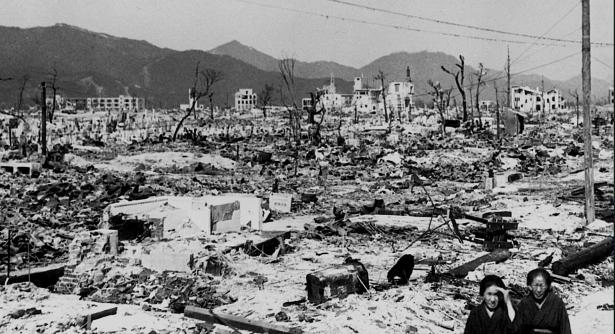A Bomb Unlike Any Other
AUGUST 6 IS THE 80TH ANNIVERSARY of the bombing of Hiroshima, Japan. Until the 1945 attack, which was the first time the newly-invented atomic bomb was used in warfare, the very existence of atomic weapons was a secret known to very few people, so the use of such an unprecedentedly lethal weapon caught the world almost completely by surprise.
Three days after Hiroshima was virtually destroyed, a second, more powerful bomb was dropped on Nagasaki, with a similar result. Five days later, the Japanese government agreed to stop fighting and surrender unconditionally.
The use of an atomic weapon, twice, on populations that included far more civilians than either combatants or those who contributed directly to military activity has resulted in an 8-decade-long ethical debate between those who argue that doing so was a necessary evil to end the war and save more innocent lives than would have otherwise been lost, and those argue that a more measured use of atomic weapons could have produced the same result with much less innocent suffering.
Without attempting to resolve that debate, it is incontrovertible that the U.S. government consciously delayed taking effective action to provide medical care to the survivors of the attacks. Even though Japanese and Chinese medical organizations began to undertake that effort almost immediately, the U.S. military undercut them with bureaucratic roadblocks. The U.S. government never took responsibility for providing medical care, leaving it to Japanese and other civilian organizations and charities.
Despite fervent pleas for quick action, the U.S. waited until 15 months after Japan’s surrender to establish a badly underfunded civilian-led organization to coordinate long-term, continuing, studies of their health. That organization, the Atomic Bomb Casualty Commission, did some important scientific work at the same time it was guilty of suppressing reports on the humanitarian consequences of the bomb in both the United States and Japan. https://press.un.org/en/2022/dc3849.doc.htm
When the K.K.K. Came to D.C.
AUGUST 8 IS THE 100TH ANNIVERSARY of the Washington, D.C., gathering of at least 30 thousand members and supporters of the Ku Klux Klan, who marched down Pennsylvania Avenue in full regalia, the largest-ever Klan demonstration in the nation’s Capital. For a detailed, fascinating, account of the event, click here: https://www.theatlantic.com/newsletters/archive/2025/03/kkk-dc-march/682136/
An Authoritarian Racist in the White House
AUGUST 9, 1835, IS THE 190TH ANNIVERSARY of authoritarian, racist, President Andrew Jackson writing a letter to encourage the U.S. Postmaster General to violate the Constitution by refusing to deliver pieces of mail containing abolitionist or other anti-slavery information unless the mail’s recipient specifically requested to receive it.
Jackson wrote that people who were opposed to slavery were “monsters” who were using the mail “to stir up amongst the South the horrors of a servile war” and called for them “to atone for this wicked attempt, with their lives.”
According to Cumberland University historian Mark Cheathem, Jackson “also recommended that Southern postmasters make a list of the people in their communities who wanted the material so that they could be ‘exposed’ in the media ‘as subscribers to this wicked plan of exciting the negroes to insurrection and to massacre.’ Jackson hoped that his fellow White Southerners would force those sympathetic to the abolitionist cause to ‘de-sist’ in their support of freedom for enslaved people ‘or move from the country.’”
Sound familiar? https://citylights.com/andrew-jacksons-face-is-a-meme-for-white-supremacy/
Getting Rid of a Brutal Occupation for 12 Years
AUGUST 10 IS THE 345th ANNIVERSARY of the beginning of one of the longest-lasting anti-colonial rebellions by North American Indigenous people. On this day in 1680 several thousand Pueblo people in what is now northern New Mexico began a well-planned rebellion against the Spanish occupation that had forced them for 80 years to provide tribute in the form of food, labor, and textiles while at the same time brutally suppressing their religious practices.
The rebellion was so well-organized that it was a complete success, killing hundreds of the colonists and driving thousands out of the territory for the next 12 years.
But then a large and heavily armed group of Spanish soldiers marched into the Pueblo territory and by threat of overwhelming deadly force was able to reestablish control. The Spanish re-occupation was peaceful at first, but the colonists soon resorted to terror, executing at least 70 Pueblo warriors. https://www.desertusa.com/ind1/pueblo-rebellion.html
Rebellion in Watts, 60 Years Later
AUGUST 11 IS THE 60TH ANNIVERSARY of the beginning of a week-long rebellion against racism by the residents of the Los Angeles neighborhood of Watts. Before the fighting ended, 34 people had been killed and nearly four thousand had been arrested.
The significance of the 1965 Watts rebellion against a social and economic catastrophe must not be forgotten. For an excellent introduction to that struggle by Robin D.G. Kelley, please click here: https://portside.org/2015-08-19/watts-50-years-later-remember-what-they-built-not-what-they-burned
For more People's History, visit
https://www.facebook.com/jonathan.bennett.7771/


Spread the word